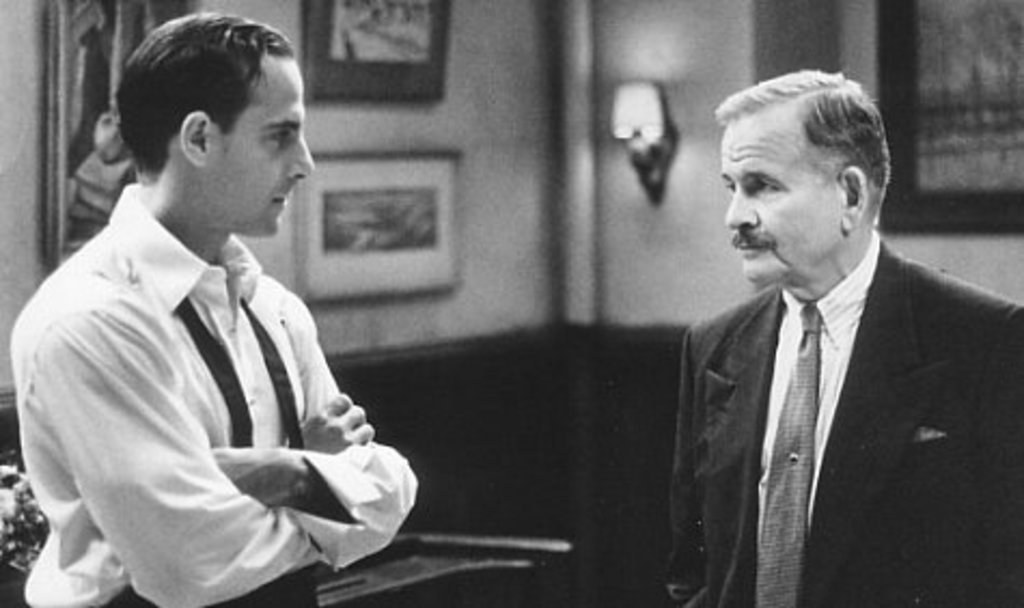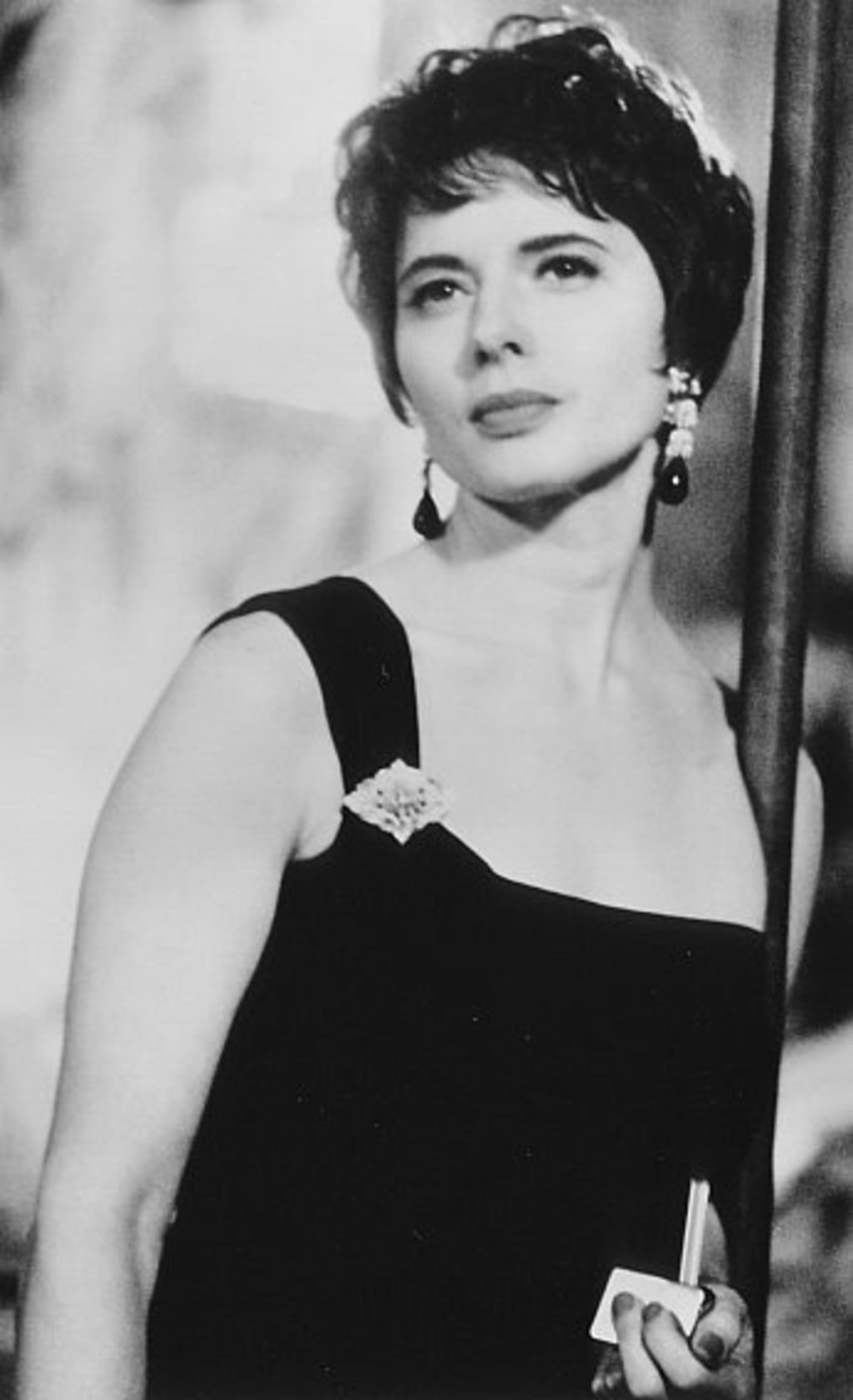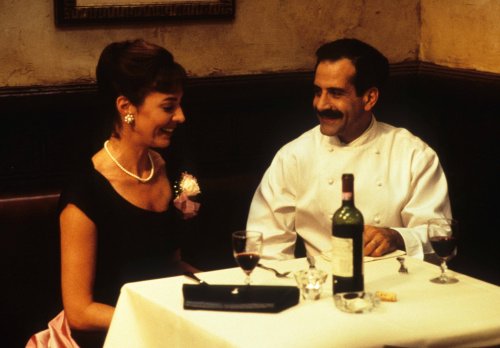Setting:
Big Night takes place in New Jersey during the 1950s.
Characters:
Primo: The oldest brother and head chef. He is very traditional and prideful about his Italian roots.

Secondo: The younger brother and financial advisor for the restaurant. He also gives advice to Primo about how to better run the restaurant.

Christiano: The busboy and helper in the kitchen.

Phyllis: Secondo’s girlfriend. She is American, and loves him dearly, desiring to get married. She does not know about his infidelity.

Pascal: The rival restaurant owner. He is both a liar and a cheat. He values his business over the good of others as well as the good of food. His food is unauthentic, or Americanized, Italian.

Gabriella: The woman who is dating Pascal and works for him as well. Secondo is having an affair with her.

Ann: The love interest of Primo. She is American and runs a flower shop.

Basic Plot:
Big Night follows two Italian-American brothers who struggle to run an Italian restaurant in the 1950’s. Primo, the oldest brother, is the gifted and temperamental chef , while his younger brother, Secondo, is the pragmatist who tries to keep the doors open. Their restaurant is barely surviving financially, largely because the rival restaurant owner of Pascal’s serves more popular and Americanized Italian food. Primo wants to cook original and complex dishes that challenge the expectations of his diners. The rival restaurant owner–who seems to be a friendly figure– tells them that he will entice famous singer Louis Prima to come to their restaurant in an effort to attract much needed attention. It is understood that an appearance by Prima would change everything for the brothers, as it could be the last saving grace for their restaurant. Primo and Secondo organize this “big night” for the celebrity, creating an elaborate menu of expensive and exquisitely prepared food for him. Prima, however, does not show. The viewer–as well as Primo and Secondo–eventually discover that Pascal, the rival restaurant owner, lied about inviting Prima. The beautiful narrative turn is that the community adores the food, and the night is a great success, despite the fact that Prima is not there. Nonetheless, the brothers are still in debt and Primo is considering going back to Italy to cook with his uncle while Secondo is flirting with the idea of working for Pascal. The brothers may fight throughout the film, but it is the strife with Pascal that brings them together in the end. In fact, the brothers end up together, whereas the other relationships in the film fall apart. Secondo’s serious relationship fizzles because he is caught cheating, and, while it is unknown what happens with Primo’s relationship with Ann (an American flower shop owner), it seems to have taken a slight hiatus because Primo focuses on his relationship with Secondo. The film has a happy ending because of the renewed love and loyalty of the brothers, but it is bittersweet because it is also true that their restaurant probably won’t survive.
Role of Food in the Film:
In Big Night, food is used to express emotion, draw people together, demonstrate authenticity, and convey purpose. Quite simply, food is essential to the lives of Primo and Secondo. It is integrated in every aspect of their lives. It is the reason they are poor, but it also helps them build relationships. Food is more than just a vehicle to satiate hunger. Food shapes their entire world.
Main Themes:
Cultural Capital: Class
Class is one of the most prevalent themes in Big Night, and cultural capital contributes to this class tension. Cultural capital is the amount of weight and influence someone has because of their culture, including way of dress, food, country of origin, etc. For example, Primo cannot say anything to the American customer who insults his cooking because he is in service. But Primo sees himself as too good for the American “Philistine” (7:50). Primo has less cultural capital than his customer, but he is proud and believes that his food gives him more culinary capital than the customer, thus making him morally superior to her.
Consumption as communication:
In Big Night, food is communicative. It is used to convey symbolic meaning as well as speak for the characters. At the big night dinner, the guests sit down at this unusually long table (1:16:30). The scene resembles the “First Supper.” The scene communicates clearly that this is the family. The guests come together to eat, celebrate, and enjoy each other. Everyone is only talking–and raving–about the food, and it is the food that convinces the audience that this meal is a form of togetherness. The concept of slow food also lends truth to the togetherness of this scene. The guests eat many courses based on local produce, and the dishes are familial recipes all characteristic of slow food ideology. Another example of food as communication is the famous scrambled egg scene. Christiano leaves and Secondo pats Primo’s back as they begin to eat together. Then Primo puts his arm around Secondo and they continue eating in silence (1:45:30). The scene may be absent of dialogue, but the act of Primo cooking for Secondo and then their silent sharing of breakfast communicates that they reconciled and reclaimed their brotherhood. This wordless scene gives the audience solace and underscores the importance of forgiveness.

Food and identity:
Class:
As discussed earlier, class is demonstrated through cultural capital, but class is also an identity marker. Primo accepts painting as payment for an artist’s dinner, saying “Money, what do I need money for?” (11:40). Primo believes that everyone deserves to be fed, regardless of their class status. The painter does not have much, but he is a guest at the Prima dinner and is seated at the head of the table (1:16:30). He may be in a lower class position, but is still fed and treated with respect by Primo especially.
:no_upscale()/cdn.vox-cdn.com/uploads/chorus_asset/file/19239318/big_niight_dinner.jpg)
Language:
Language is also an identity marker. Throughout the film, Italian is spoken, drawing the viewer’s attention to their culture. They speak Italian when they want to be secretive (39:00), but also to demonstrate their connections to and intimacy with others (45:00 and 1:02:00).
Family
The entire film is based on the relationship between two brothers. Family is, by far, one of the most influential identity markers in this film. The brothers consistently bicker and fight; for example, when Secondo tells Primo to go back to Rome to work with Uncle Paolo, he ends it with “fuck you”(1:33:30). But later Secondo defends Primo to Pascal saying “You will never have my brother, he lives in a world above you” (1:39:10). Family ties ultimately conquer, as they are strong and unbreakable in Big Night. The film well emphasizes the intense value that Italian people place on family.
Gender
The women in the film do not have cooking roles and may occupy lower status than the men, but they are nonetheless influential characters. Although the female characters are depicted as women might have been treated at that time, the director also made sure that the viewer sees their true and complex selves. Deeply intelligent yet overlooked, Phyllis and Gabriella even bond over the stupidity of men(1:12:40).

Tradition and authenticity: Authentic Italian vs Americans perception of Italian:
Authenticity may be relative, but, for Primo, only food that best represents Italy is authentic, and he is deeply protective of the authenticity of his food. At one point, he suggests that Pascal’s spaghetti and meatballs are “raping food” because his meatballs are placed on the pasta, which is not authentically Italian (54:28). Early in the film, an American family dines at Primo’s restaurant, orders risotto, claims it is not what they ordered, and then asks for a side of spaghetti and meatballs with it (6:00). This enrages Primo, as eating two carbs and sitting meatballs on spaghetti is not Italian. Because of this risotto debacle, Secondo proposes to take risotto off the menu, Primo responds with “Why don’t we put a hotdog on the menu? People will learn to appreciate Italian food.” Secondo answers “This is a restaurant, not a fucking school” (14:00). The Americanization of Italian food is a theme of the film. Pascal is the embodiment of non-authentic Italian food and Primo hates him for it. Worse, Pascal’s restaurant looks like how ignorant Americans would describe Italy. His restaurant may be a caricature of Italian culture and cuisine but it is successful, whereas Primo and Secondo’s restaurant is authentic but not trafficked.
Opinion of Big Night
Big Night is a remarkable film in so many ways. One of the significant strengths of the film is its distinctive and highly creative cinematography. From the long preparation scene of scrambled eggs (1:42:00) to the shot of a lamp blocking Pascal’s face to create tension (27:00), to a shot of Christiano looking out over the city and smoking (1:00:00)–each scene is framed with symbolic intent or, at least, a deep cinematic beauty. Another strength of Big Night is the memorable character development throughout the film. For example, each character has a characteristic way of speaking., Pascal is very loud, curses a lot, and is eccentric. He says “Goddammit, I should kill you” (1:19:35), solely because the Timpano that Primo and Secondo made was so delicious. Each character in the film is so relatable. Personally, I do not see many weaknesses in the film. I think that the only weakness of the film might be its relatability on a cultural level. The film is certainly centered on Italian American culture, and I believe that Italian Americans may be able to relate to it more than others. At the same time, I genuinely think that the audience will be able to recognize themselves in at least one of the characters. It is also true that the general themes of the film–longing, infidelity, class tension, and the drive for acceptance– are universal and present in every cultural group.

References:
V. A. P. (2015, April 27). Big Night: A film deliciously crafted. https://mdurant31.wordpress.com/2015/04/27/big-night-a-film-deliciously-crafted/
Big Night (4/9) Movie CLIP – I Want a Cowboy (1996) HD. (2012, February 17). Youtube. https://www.youtube.com/watch?v=24qcFHAk1Cw
Film: Big Night. (n.d.). , https://www.christopher-east.com/2014/05/05/film-big-night/
lionsroar. (n.d.). Stubs – big night. 1, http://trophyunlocked.blogspot.com/2016/07/stubs-big-night.html
Lorraine, S. (2017, March 22). WCW: Minnie Driver. http://www.frockflicks.com/wcw-minnie-driver/
Movies, N. (n.d.). Big Night Netflix. , https://www.netflixmovies.com/big-night-1996
Scott, C., Tucci, S., & Tropiano, J. (1996, September 20). Big Night.
Timpano alla “Big Night.” (n.d.). The New York Times. Retrieved May 13, 2021, from https://cooking.nytimes.com/recipes/12799-timpano-alla-big-night